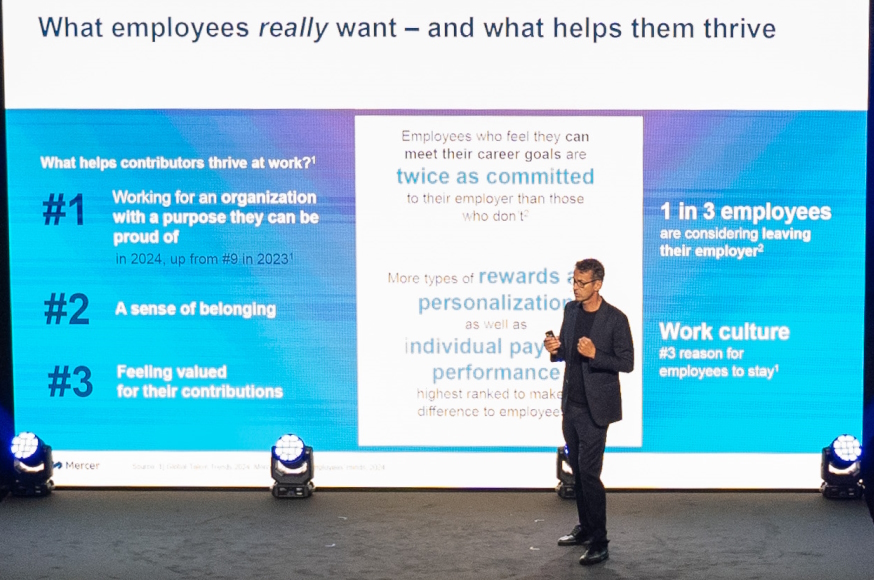Kai Anderson at the Figure Baltic Advisory salary seminar: the key to survival is collaboration between artificial intelligence and human intelligence
24.09.2024
"Alongside pandemics and geopolitical tensions, we have to deal with climate change. At the same time, we are facing major trends that are changing the world of work - a change in the way we work born out of the pandemic and the frantic development of artificial intelligence. At the same time, the human population is ageing and the workforce is shrinking. In Japan, 10% of the population is already over 80 years old, and many major economies are moving in the same direction," said Anderson. "So the labour shortage is not going away. At the same time, productivity growth has slowed, even though people are busier than ever and there is a constant shortage of time."
We live in the age of the people
In the face of all this, we are facing a poly-crisis, and we need to make the best possible use of human and artificial intelligence. "Our biggest challenge is the long-term sustainability of humanity. We have finally exited the industrial age, but the question is where have we entered - the digital age or the human age? I believe we are in the human era. Employers can no longer treat people as employees, rather they should be seen as contributors. The key question is how to create the most supportive environment for your people to achieve the best results," said Anderson. "The first and most important aspect for people is the meaning of work, something to be proud of. The second is a sense of belonging, which is increasingly important in a fast-changing environment. Thirdly, it's important for everyone to feel that their work is valued. What has become more important is that employers offer both individual rewards and a pay linked to personal performance."

The biggest barrier to success at work is stress. "The pandemic was a tremendous stressor and in fact it is still in our system, we haven't fully deciphered it. We're working faster and faster, being busier and busier, but we're not working better because of it. In addition, financial strain is a problem for almost half of workers, with around 40% of people in surveys reporting fatigue and heavy workloads," said Anderson."
Unfortunately, people's trust in their employers is also declining. On the one hand, we trust our employers more than other institutions, such as politicians, the media or the church, but this trust is melting away. During the pandemic, for example, 80% of workers felt that their employer behaved in a way that was best for their employees, compared with 69% today. We need to prevent this figure from falling further. 42% feel mentally safe at work, only 35% feel they can always speak their mind and 59% feel safer working from home."
Artificial intelligence is an amplified intellect
"Artificial intelligence brings the possibility of scaling work to levels that were unimaginable before. Already today, it is making the work of programmers incredibly faster, with 56% of them able to complete tasks faster, and the same is true for various types of writing, where it has been able to speed up the work of 37% of people," said Anderson. Workers supported by AI save an estimated 36 working days a year, creating many opportunities for both workers and employers. At the same time, only 13% of employers believe that workers are ready to adapt to changes in technology. "The obvious fact is that most people's work will be transformed by AI, with an estimated 80% of jobs being affected. We are seeing an increase in the share of complex, expert work that AI can help with. At the same time, repetitive and time-consuming tasks that AI takes over will disappear. This will help create value, work smarter and ultimately work less. The faster we adapt, the faster we can free up time. Employers need a plan to redesign work, to find the best ways to combine human and machine. People, on the other hand, need support from employers to adapt to this change, to be encouraged, to be introduced to different success stories, to be educated. Ultimately, both employees and employers will benefit from increased efficiency," Anderson added.
Among the skills on the rise are the role of creative thinking, analytical reasoning, technological literacy, lifelong learning readiness as well as flexibility and resilience in working life. People and employers need to be prepared for new skills to be acquired in the coming years. "Employers need to understand how artificial intelligence is changing the roles of the people in our organisation, what skills we need to develop. Planning is needed to cope with this change, and of course the biggest winners will be those who can adapt faster," said Anderson.
Kai Anderson is Head of Transformation at Mercer, an international management and HR consultancy. Throughout his career, Kaid has repeatedly been recognised as one of Germany's leading HR and workplace experts. Anderson is the author of "The agile company: How organizations reinvent themselves" and " Digital human: People at the heart of digitalization" . He is also one of the authors of "Work different: 10 Truths for Winning in the People Age" and "The Human-Centric Enterprise".
